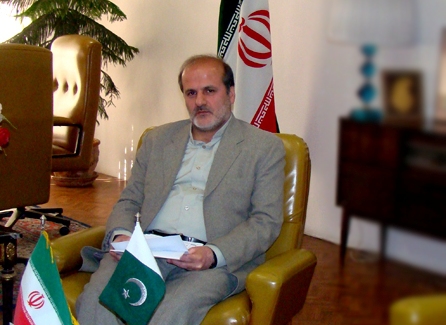 Islamabad, Aug 8, IRNA � Iranian consul general to Pakistan spoke here Thursday of the two countries? determination to drastically expand border trade. Hossein Yahyavi made the comment in 2nd Joint Committee of Iran-Pakistan Border Trade.
Islamabad, Aug 8, IRNA � Iranian consul general to Pakistan spoke here Thursday of the two countries? determination to drastically expand border trade. Hossein Yahyavi made the comment in 2nd Joint Committee of Iran-Pakistan Border Trade.?Convening of the 2nd Joint Committee of Iran-Pakistan Border Trade Commission provides a good opportunity for the expansion of border trade between the two countries,? said the Iranian diplomat, focusing on the new serious steps taken by Tehran and Islamabad in that respect.
The 2nd Joint Commission of Iran-Pakistan Border Trade Committee was held on Wednesday and Thursday, August 7 and 8, 2014, in Quetta, the capital city of Pakistan?s Baluchistan state.
The Iranian delegation in the committee was comprised of 16 members from Iran?s Sistan-o Balouchestan province, headed by Nader Mirshekar, the provincial head of Industries, Mines and Trade Organization.
Iran?s consul general in Quetta Seyyed Hassan Yahyavi said in an interview with IRNA that the 1st Iran-Pakistan Border Trade Committee was convened in the year 2009 in Iran?s Zahedan City.
Focusing on the outcomes of the 2nd joint committee, Yahyavi said that the committee was in the framework of joint economic-trade cooperation and good agreements were reached in it between the two sides.
He said that the reason why there was such a long gap between the 1st and the 2nd border trade committees of Iran and Pakistan was the existence of certain difficulties in the field of the required harmonies between the two sides, as well as the security concerns in Pakistan?s Baluchistan state.
Referring to some of the agreements in the 2nd committee, he said that issues such as quarantine on plants and kettles, unifying the two countries? customs organizations? working hours, provision of facilities for the two countries? drivers in each others? soils, expansion of joint border markets, revising the preferential trade tariffs, and making easier the customs procedures aimed at assisting the two countries? merchants.
?The two sides agreed to have greater cooperation in blocking the path for smuggling goods from Iran to Pakistan and vice versa and to regulated the smuggled goods? affairs,? said the Iranian consul general to Quetta.
He said that normally fuel is smuggled into Pakistan and rice and other agricultural products from Pakistan into Iran.
On the time for holding the 3rd Joint Committee of Iran-Pakistan Border Trade, Yahyavi said, ?The proposal is holding this committee once a year, but the two countries? customs, border guards, and immigration officials will convene joint sessions once every three months at joint border regions.
He reiterate that the Iranian delegation also had meetings with the prime minister of Pakistan?s Baluchistan state and the governor of that state and held good talks with them.
The Iranian consul general also informed that the 19th Joint Economic Commission of Iran and Pakistan at ministerial level will be held on September 2-3, 2014, and the issues to be addressed there include such significant matters as the gas pipeline, Iran?s electricity exports to Pakistan, and reconstruction and construction of roads and railroads in Pakistan.
Meanwhile it was reported on April 7, 2014 that Iran, Afghanistan and Pakistan have decided to increase border trade, Governor-General of Iran�s Sistan-o Balouchestan province Ali Awsat Hashemi had said at the time.
He told reporters that there are potentials for the establishment of two new free trade zones in the Southeastern province of Sistan-o Balouchestan.
Iran aims to develop cooperation with the neighboring countries including Pakistan and Afghanistan to enhance investment and trade in the border areas.
Hashemi pointed to a joint commission that has been established by the governors general of Iran�s Sistan-o Balouchestan province, Pakistan�s Balouchestan province and Afghanistan�s Nimruz and Farah provinces.
By IRNA
The Iran Project is not responsible for the content of quoted articles.











